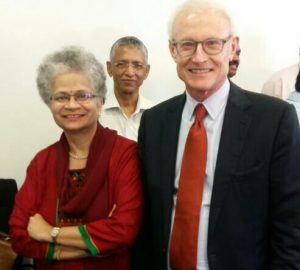Business strategy as a discipline is deficient without the models and theories put across by Michael Porter; he is the world’s one of the distinguished strategy professors. His concepts on strategy are taught all over the world in the business schools and seminars. Value Chain, Five Force Model, Competitive Advantage, Generic Strategies, Four Corner Model are the foundation of strategic management syllabus. Michael Porter is t he doyen in the field of business strategies.
he doyen in the field of business strategies.
On 23rd May 2017, the Tata Trusts had organized a session on “Transforming World: The Role of Business in Society” the speaker was Michael Porter. One of my friends Ms. Debsmita Pani who works for Tata Trusts invited me for the session. And, for me this was a propitious occasion, after all hearing Prof. Porter speaking in person is an exceptional opportunity.
Prof. Porter’s talk was focused on CSR. He feels why should companies turn to NGOs and governments to solve society’s major problems? It is time for business organizations to address societal needs and challenges through creating shared values, in which a company prepares a business model addressing a social cause which will augment their profits. Because when business solves an external problem, it makes a profit and in return the action lets that solution grow. The shared value concept enhances corporate policies and practices add to the competitiveness of a company while simultaneously advancing social and economic conditions in the communities in which the company sells and operates.
Prof. Porter emphasized that profit involving shared value enables society to advance and companies to grow faster. When corporates incorporate societal issues into strategy and operations major transformations take place. He gave examples of the Fortune 500 companies ‘change the world list of 2016’.
GlaxoSmithKline ranks at number one in the 2016 list. GSK has made a calculated bet on intellectual property leniency in poor nations; it releases drugs from patent protection by lowering their prices. Though it lowers their revenues a bit, but GSK says it doesn’t lose money in any market where it operates. Over the time the approach builds goodwill and a strong market presence around the globe.
IDE Technologies, which is considered a leader in desalination technologies, turns salt water into fresh water. The Israeli company supplies 70% of the tiny Middle Eastern country’s potable water. Its largest local plant, located just south of Tel Aviv, produces 165 million gallons of freshwater daily. Though privately held, IDE also builds and operates some of the biggest desalination plants in about 40 other countries, including Mexico, Chile and China.
General Electric (GE) launched its massive renewable business strategy called ‘Ecomagination’ which in fact GE’s growth strategy to enhance resource productivity and reduce environmental impact at a global scale through commercial solutions for their customers and through their operations. They started their strategy with a pledge to generate power worth $20 billion in annual revenue from green products.
The 2016 list has only two Indian companies in it – Cipla and Godrej Group of Companies. According to Prof. Porter, India is land of opportunities and sky is the limit for Indian organizations to start profitable ventures related to societal problems such as climate change, water management, education, healthcare, rural upliftment etc. Business managers need an approach of engaging with the external environment with an eye of expanding business through finding solutions to some pressing problems. Organizations need to look at how good they are at external engagement: they should answer questions such as – can they innovate something to do better externally, whether they are ready internally to begin on a cause, and how to march ahead. Business organizations are not monolithic entities, but organizations governed and lead by individuals and anchored in the societies in which they conduct their businesses. Corporate social responsibility schemes reflect the human side of organizations.
India is the first country in the world to make the corporates shell out from their annual revenue to charity from April 2014. There are many areas in which they can invest. The major problems are hunger, poverty, healthcare and education. A survey by accountancy firm KPMG found that 52 of the country’s largest 100 companies failed to spend the required 2% in previous two years. A smaller proportion has gone further. According to an Economic Times investigation, corporates are allegedly deceiving the system by giving donations to charitable foundations that later return the monies minus a commission.
So rooting CSR through the business is not all that great idea at the moment; how much to give and how much to expect in return is a question for most companies. Prof. Porter’s idea of ‘’creating shared values through CSR’’ is profound and has a lot of depth. There are many examples doing great work through sharing values with external environment. After all, being socially good is more profitable for a business.













































